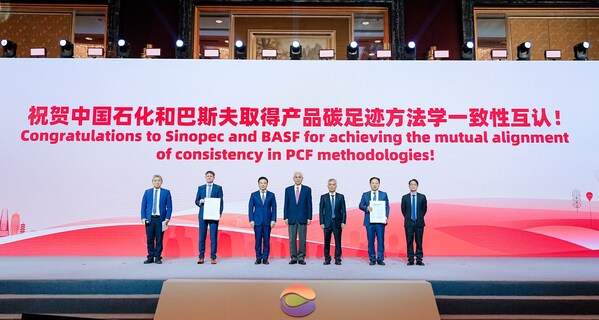 |
NINGBO, China, Oct. 31, 2025 /PRNewswire/ — China Petroleum & Chemical Corporation (HKG: 0386, “Sinopec”) and BASF jointly declared the alignment on the core requirements of carbon footprint accounting methods and reached framework-based mutual recognition of methodologies at the 2025 China International Petroleum and Chemical Conference (CPCIC 2025) hosted from October 22 to 24 in Ningbo.

Sinopec and BASF Mutually Recognize Product Carbon Footprint Accounting Methods, Sets New Benchmark for Industry Standardization.
The consensus, as a corporate example for China’s push to achieve international convergence and mutual recognition of product carbon footprints, marks a key step in low-carbon transformation cooperation between Chinese and German chemical enterprises, taking the lead in establishing mutual trust in product carbon footprint data between Chinese and foreign companies.
Sinopec and BASF jointly commissioned globally leading third-party certification body TÜV Rheinland to conduct a consistency review of both parties’ methodologies. After multiple rounds of evaluations, TÜV Rheinland confirmed that both methodologies comply with international standard ISO14067:2018 and China national standard GB/T 24067–2024, and remain consistent in core elements. A formal consistency statement was issued, leading both parties to a mutual recognition consensus for their product carbon footprint accounting methods.
This move will significantly enhance the comparability and transparency of carbon footprint data across regions and value chains, improve data utilization efficiency, promote coordinated carbon reduction in the industry chain, and contribute to the green, high-quality development of both enterprises and the wider industry.
Sinopec has been at the forefront product carbon footprint management. In 2015, it was China’s first to launch research on product carbon footprint accounting, initially developing a methodological framework for petrochemical products. In 2023, Sinopec achieved China’s first automated carbon footprint accounting for petroleum and chemical products.
In 2024, together with CNPC, CNOOC, PipeChina, and four other enterprises, it initiated and formed China’s first Carbon Footprint Alliance for the energy and chemical industry chain, working collaboratively to reduce emissions across the supply chain.
Since 2021, China has been gradually building a carbon footprint management system and exploring the establishment of standards for products’ full life-cycle carbon footprint, with the goal of preliminarily establishing such a system by 2027 and publishing national product carbon footprint accounting general standards in line with international practice.


